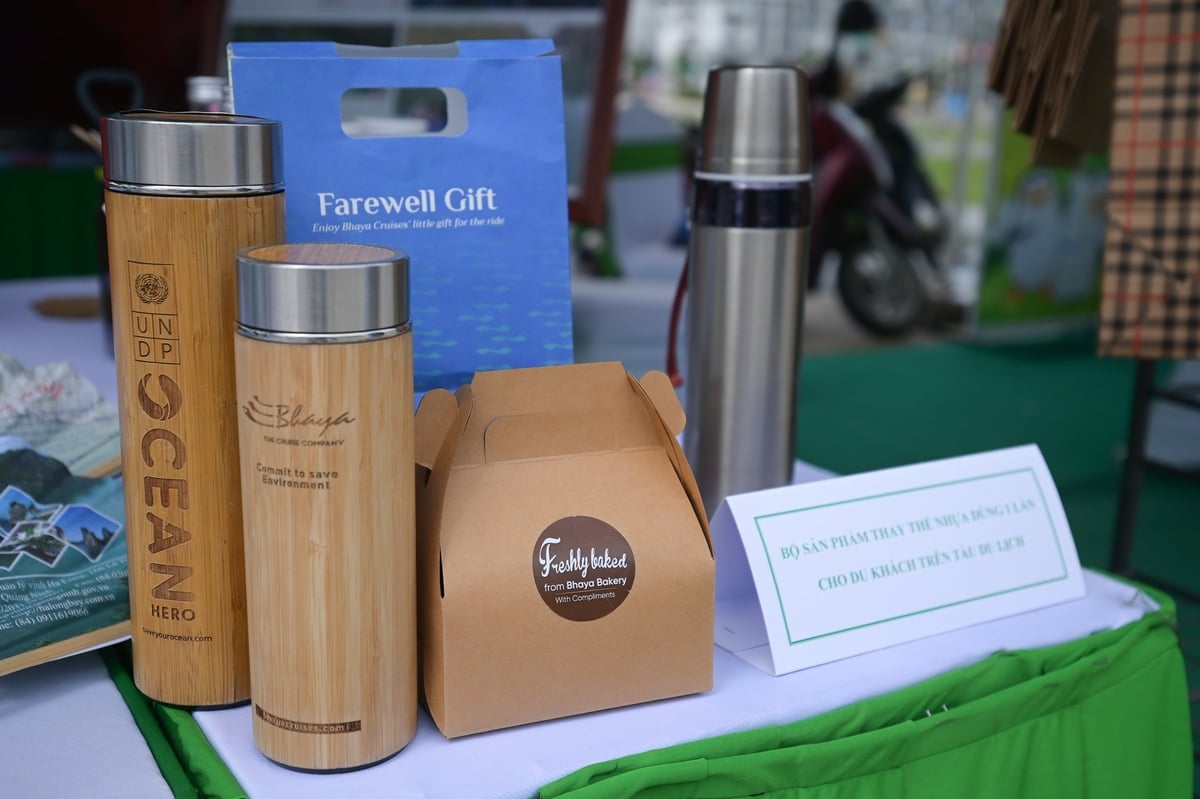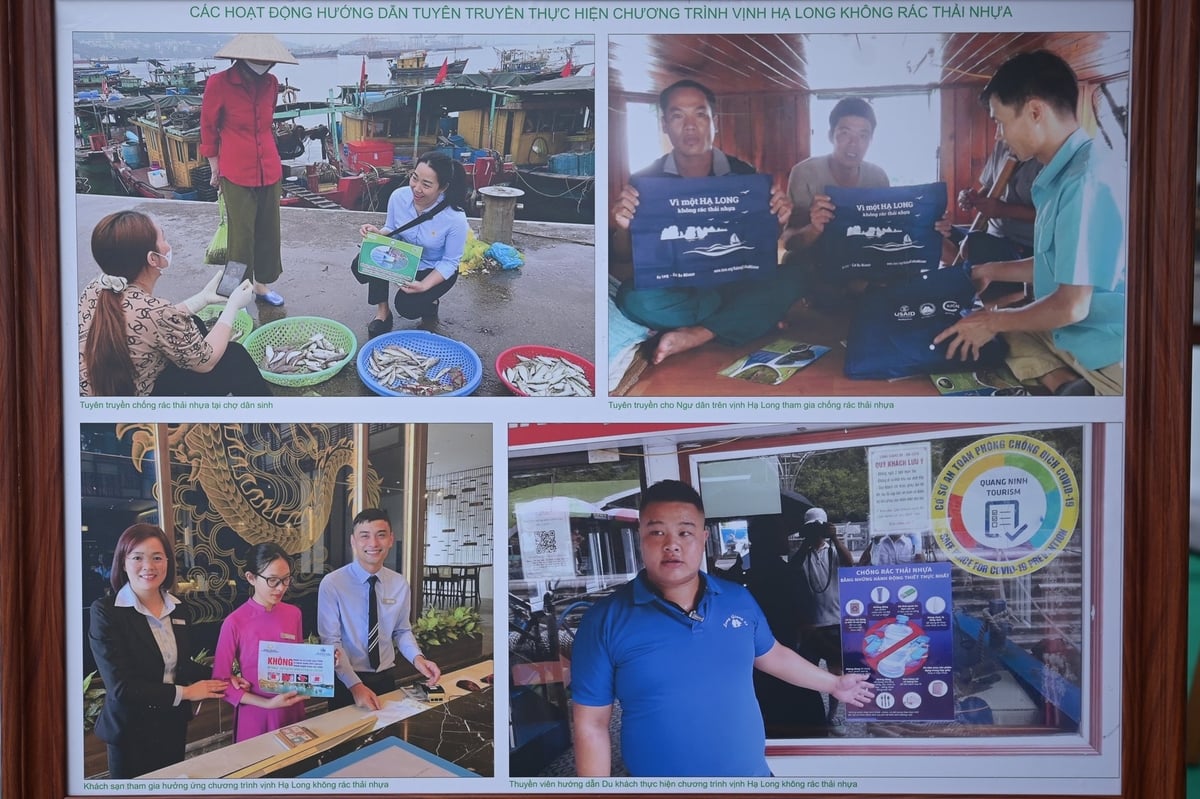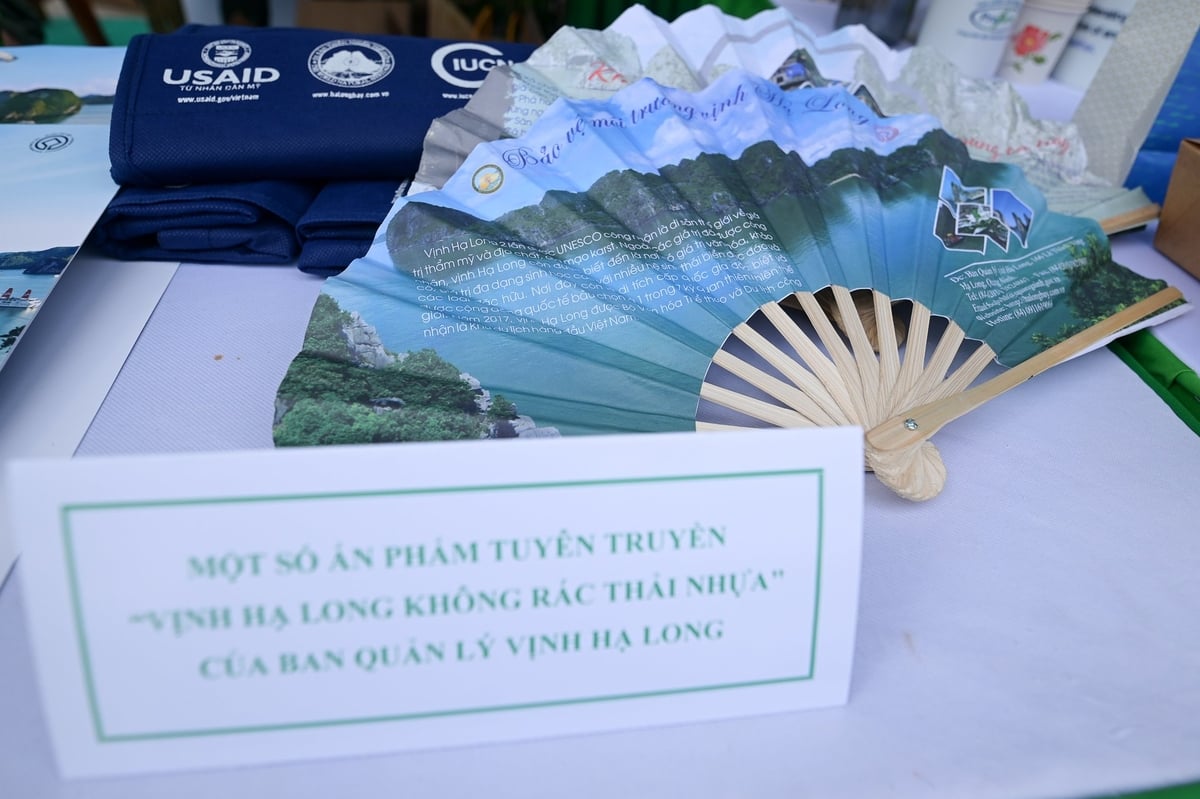December 1, 2025 | 11:05 GMT +7
December 1, 2025 | 11:05 GMT +7
Hotline: 0913.378.918
December 1, 2025 | 11:05 GMT +7
Hotline: 0913.378.918

A collection of single-use plastic alternatives for visitors on Ha Long Bay cruises. Photo: Tung Dinh.
Since 2019, the Ha Long Bay Management Board has implemented the "Plastic-Free Ha Long Bay" initiative in accordance with the directives of the Prime Minister and the Quang Ninh People's Committee to address plastic pollution. In addition to implementing various environmental protection measures, this campaign prohibits the sale, purchase, and use of single-use plastic products in tourism and service activities on the bay.
The board divided the area into two zones to enhance the effectiveness of waste collection: the core heritage zone and the buffer zone along the shoreline.
To prevent and reduce refuse from entering the bay, Ha Long City authorities oversee collection efforts in the buffer zone, with a particular emphasis on shoreline and coastal areas. The Bay Management Board oversees the core zone, which centers on socio-economic activity hubs, including tourist routes, aquaculture areas, commonly littered locations (e.g., island bases, beaches), and water flows from the coast into the bay.

The Ha Long Bay Management Board has implemented awareness campaigns to discourage the use of plastic. Photo: Tung Dinh.
Furthermore, the board frequently coordinates clean-up campaigns during periods of high pollution, enlisting the support of local communities, organizations, and individuals to establish a broad-based marine protection movement.
The board has also implemented measures to discourage littering by installing floating trash receptacles in active socio-economic zones on the bay, placing waste-sorting bins at tourist sites, and mandating that tour operators collect waste and maintain the environment. The refuse that is collected is transported to shore and processed on the same day.
Community awareness campaigns are essential due to the high volume of tourists that visit the estuary on a daily basis. Through initiatives such as "Green Sundays" and enhanced media engagement at both the national and local levels, the board actively advocates for environmental protection among tourism businesses, travelers, coastal residents, and fishers.

Posters promoting the reduction of plastic waste in Ha Long Bay. Photo: Tung Dinh.
Additionally, the board's staff and guides distribute messages through signage and public address systems at tourist sites. Quang Ninh's technical standards necessitated the substitution of foam buoys on floating structures with environmentally favorable alternatives. Docking sites near the shore, local fish markets, and coastal communities have also been the focus of efforts.
The Bay Management Board has actively collaborated with both domestic and international partners, including UNESCO, IUCN, JICA, Osaka University, and the Japanese Embassy in Vietnam, to implement environmental protection projects for Ha Long Bay. These initiatives include the restoration of mangroves, the implementation of environmental monitoring and analysis, the organization of capacity-building study tours, the installation of wastewater treatment systems at tourist destinations utilizing Jokaso technology, the collection and transportation of waste from the bay, and the implementation of extensive awareness campaigns to reduce plastic waste.

Canned mineral water that is recyclable is replacing plastic bottles. Photo: Tung Dinh.
The "Plastic-Free Ha Long Bay" initiative has garnered significant community support and active participation from businesses, residents, tourists, and travel agencies, as well as the Ha Long International Cruise Port, thanks to these efforts.
Hundreds of tourism boat operators, kayak service providers, and aquaculture businesses have signed commitments with the Ha Long Bay Management Board to discontinue using single-use plastic products in their tourism activities.
The Worldwatch Institute estimates that since 2002, around 5 trillion plastic bags have been produced globally each year, with a significant portion used once and then discarded into the environment.
Both national governments and the international community are becoming increasingly aware of the unpredictable and harmful consequences of plastic waste, particularly its direct and severe impacts on ecosystems and human health.
Vietnam discharged approximately 1.8 million tonnes of plastic waste, including over 30 billion nylon bags. On average, each Vietnamese household uses approximately 1 kg of nylon bags per month, with more than 80% of them being discarded after a single use.
The Ministry of Agriculture and Environment and the Quang Ninh Provincial People's Committee jointly organized the official rally to commemorate World Environment Day (June 5) and inaugurate Environment Action Month 2025. The Agriculture and Environment Newspaper served as the implementing unit.
The United Nations Environment Programme (UNEP) has initiated the global theme "Beat Plastic Pollution" for this year's event.
Petrolimex, PV GAS, Petrovietnam, TKV, Vinamilk, La Vie, VIMC, EVNGENCO1, and URENCO are among the program sponsors.
Translated by Linh Linh

(VAN) The inevitable path forward is to reorganize production along the value chain, utilizing cooperatives as the core, enterprises as the driving force, and farmers as the central subjects.

(VAN) On November 28, Minister Tran Duc Thang, together with China's Minister of Agriculture and Rural Affairs Han Jun, chaired the 2nd meeting of the Viet Nam - China Agricultural Cooperation Committee.

(VAN) Forest carbon credits are only accepted when they ensure absolute environmental integrity, additionality, permanence, and transparency.

(VAN) Viet Nam partners with Beijing on controlling air pollution, cross-regional management, high-tech monitoring and relocating polluting facilities.

(VAN) With a USD 50 million investment, Australia is partnering with Viet Nam to operate its first public electric bus fleet and develop a nationwide EV charging network.

(VAN) On November 28, in Beijing, Minister Tran Duc Thang met Minister of Ecology and Environment of China Huang Runqiu, to share experience on environmental protection.
/2025/11/28/0950-2-120557_751.jpg)
(VAN) The recent flood spell in the South Central region clearly reflects the characteristics of natural disasters in 2025, which are compound, prolonged, and amplified.